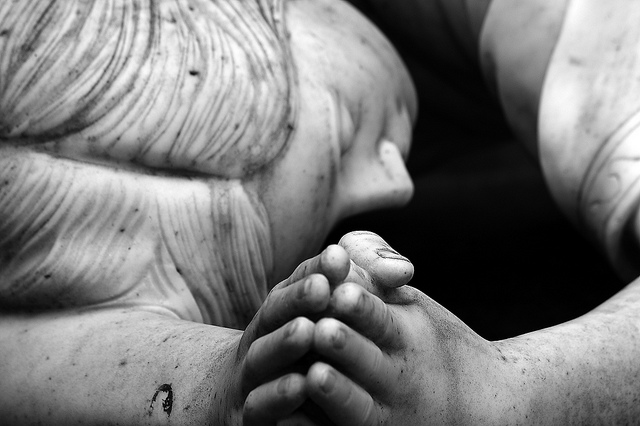We run our website the way we wished the whole internet worked: we provide high quality original content with no ads. We are funded solely by your direct support. Please consider supporting this project.

Why Prayer Matters
Two questions about prayer:
- What possible difference can prayer make to an all-good and all-powerful God?
- Why would an all-wise God leverage so much of his will being done on earth on whether or not his people talk to him?
These questions began to be resolved for me when I began to think about prayer in light of God’s purpose for creation. God created humans to be his viceroys on the earth. We were placed here to administrate God’s loving providence “on earth as it is in heaven.” Out of the fullness of life we get from our relationship with God, we were to reflect God’s loving character and purpose to each other, the animals and the earth. He gave us “say-so” over this domain, with the goal that we would, in love, choose to align our “say-so” with his “say-so” so that his loving “say-so” would reign on the earth through us. We were thus to be co-laborers with God and co-rulers with Christ (2 Tim. 2:12; Rev. 5:10, 20:6), ensuring that the earth would be the domain of God’s reign—the Kingdom of God.
We all know we have “say-so” on a physical level. Our ideas, words and bodily activity impact others and affects what comes to pass, for better or for worse. The Bible’s teaching on prayer reveals that this isn’t our only, or even our primary, “say-so.” We also have a “say-so” to impact God and to affect what comes to pass on a spiritual level, and this “say-so” is activated when we communicate with God.
In this light, it’s really no more difficult to understand why God would to some extent leverage his will being done “on earth as it is in heaven” on prayer than it is to understand why God would to some extent leverage anything on our choice to use our physical ‘say-so” in various ways. If God wants a world that is capable of sharing in and reflecting his love, he must populate it with free agents who have their own “say-so”—and to this extent the accomplishing of his “say-so” on earth must depend on how we freely choose to use our “say-so.”
Nor do I any longer find it hard to understand why God leverages so much on whether or not his people use their spiritual “say-so” in ways that align themselves with his will. Think about it. Everything about God’s purpose for creation is centered on our choosing to enter into a loving relationship with him. Relationships are all about communication. We relate to others only as we communicate ourselves in a variety of ways to them and they communicate themselves to us. Relationships and communication are two sides of the same coin.
If the central goal of creation is a relationship with God that empowers humans to be God’s viceroys on the earth, it makes sense that God would design the world such that communicating with him would be a central means by which we carry out our viceroy duties. While it violates the common sense of our carnal minds to trust in prayer, if you think about the matter in terms of God’s purpose for creation, it makes sense that the most important exercise of our “say-so” would be bound up with our communication with God.
God thus restricts much of what he can do on whether or not his people communicate with him. He structures reality in such a way that a great deal of what comes to pass revolves around, and hinges upon, our communicating with him.
The following analogy may not work for everybody, but it helps me sometimes to think of power in terms of “units of say-so.” God is all-powerful, which means he owns all the “say-so” there is. But when he decided to populate the creation with free agents, he gave each human various units of “say-so.” (He also gave angels “say-so,” but let’s keep it simple and just focus on humans for the moment.) We each have a certain amount of power to affect what comes to pass by our choices.
Now, because God’s central goal in creation was to invite people to enter into and cultivate a relationship with him, and because relationships are all about communication, God also set aside a vast reservoir of “say-so” that is accessed only by communicating with him. Because of how central this objective is for God, he covenanted with himself to release this “say-so” only if his people pray. There is thus a vast array of possible things that God would like to do but which he will not do—indeed, given his covenant with himself, that he cannot do—unless his people align their hearts with his in prayer. Of course he has the sheer power to do whatever he wants. But given the kind of world he created, there are things he cannot do unless his people align their hearts with him in prayer.
This is an analogy that helps me understand all the “if – then” statements attached to prayer in the Bible. It explains the incredible urgency Jesus and the rest of the Bible attaches to prayer. As John Wesley, Watchmen Nee, and many others have argued, to a significant degree, God genuinely needs his people to pray to accomplish his will on earth as it is in heaven.
Image by _Pek_ via Flickr
Category: General
Tags: Free Will, Prayer
Topics: Hearing God, Prayer
Related Reading

Podcast: Why Must God Wait for Prayer to Meet Our Needs?
Is God a bad father? Greg explores the intricacies and nuances of prayer. http://traffic.libsyn.com/askgregboyd/Episode_0404.mp3

Predestination Part 2: Seeing Destiny Rightly
For Part 1, click here. In Ephesians Paul teaches that God “chose us in [Christ] before the creation of the world to be holy and blameless in his sight” (Eph 1:4). In Christ, Paul continues, God “predestined us for adoption to sonship…to the praise of his glorious grace, which he has freely given us in…

How do you respond to Acts 2:23 and 4:28?
Question: Acts 2:23 and 4:28 tell us that wicked people crucified Jesus just as God predestined them to do. If this wicked act could be predestined, why couldn’t every other wicked act be predestined? Doesn’t this refute your theory that human acts can’t be free if they are either predestined or foreknown? Answer: In Acts…

Podcast: If Open Theism is True, Does it Make Sense to Pray For Intercession?
Greg talks about prayer and freedom. Specifically, if free will is so important, why would God override it in answer to prayer? http://traffic.libsyn.com/askgregboyd/Episode_0123.mp3

If salvation depends on our free choice, how are we saved totally by grace?
Question: I’m an Arminian-turned-Calvinist, and the thing that turned me was the realization that if salvation hinges on whether individuals choose to be saved or not, as Arminians and Open Theists believe, then we can’t say salvation is 100% by grace. If we have to choose for or against God, then the credit for our…

Reflecting on the Lord’s Prayer
Jesus begins the instruction on prayer (Matthew 6:9-13) by telling his disciples to pray for the Father’s name to be “hallowed,” for his kingdom to come, and for his will to be established on earth as it is in heaven. He is, in effect, telling them to pray for the fulfillment of everything his ministry,…
